LOCAW FINAL REPORT
CLICK ON THE IMAGE TO DOWNLOAD REPORT
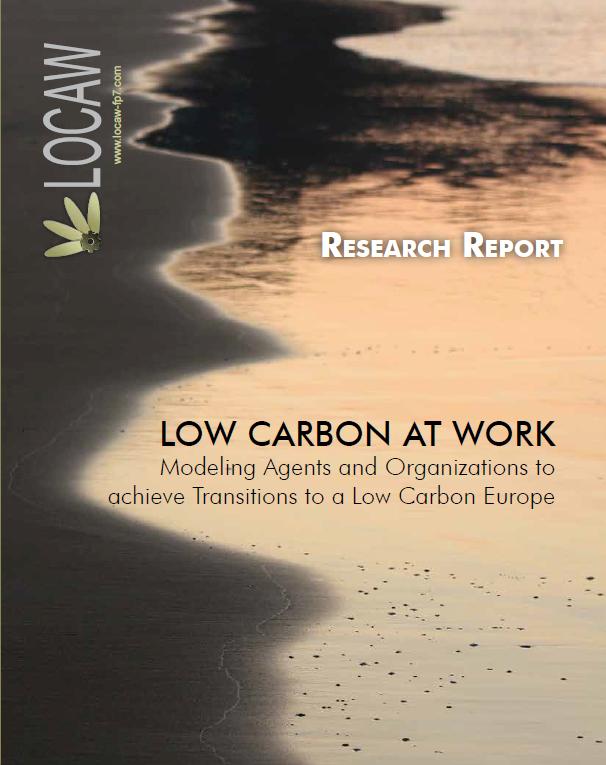
DELIVERABLES
CLICK ON THE IMAGES TO DOWNLOAD REPORTS
DIAGNOSIS OF EVERYDAY PRACTICES OF PRODUCTION AND CONSUMPTION IN THE ORGANIZATION
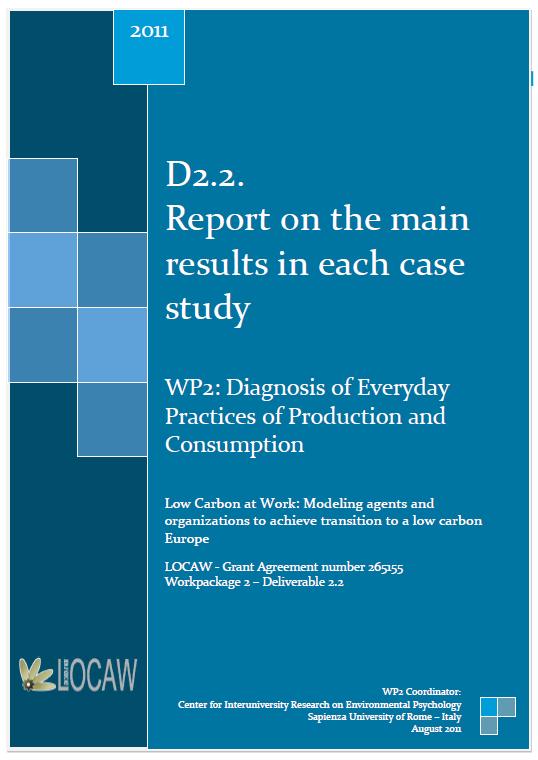
The WP2 is composed by a series of qualitative studies, carried out in four different countries (Spain, Romania, Italy, The Netherlands) in four different organizations (The University of Corunna in Spain, The Aquatim company in Romania, the Enel Green Power company in Italy, and the Municipality of Gorningen in The Netherlands).
The main aim of the WP2 is to provide an assessment of existing everyday practices and behaviours in the workplace, which have an impact on the level of greenhouse gas emissions. In order to fulfil the objectives of LOCAW, each national research team has studied the environmentally-relevant everyday practices in the four different organization considered, focusing on three main categories of organizational practices:
- Consumption of materials and energy
- Waste generation and management
- Organization-related mobility.
The results of the analyses conducted so far and reported in the present document will serve as a baseline in order to develop the next steps of the research activities previewed in the LOCAW.
The present report provides information on the way organizational processes are structured in higher education and research institutions, what kind of everyday practices workers perform and what policies the organization has implemented so far in order to enable transition to a more sustainable working environment and working practices.
For this baseline diagnosis, a mix of qualitative research approaches has been used, in relation to three different sources of data and information:
a) Interviews with key-informers situated at different levels of decision-making
b) Focus Groups.
c) Document analysis
Thus, the results presented and the data obtained here as part of Workpackage 2, which constitutes the first stage of the LOCAW project, will be used to orient the next stages of the research, as well as to fine tune the research instruments for the following work packages.
In particular, the present results will be used to define with more detail the research methods, tools and procedures to be followed in the next work package (WP3), which will be focused on the investigation of the barriers and drivers of sustainable practices at work.
STRUCTURAL AND ORGANIZATIONAL FACTORS INFLUENCING SUSTAINABILITY-RELATED EVERYDAY PRACTICES IN THE WORKPLACE
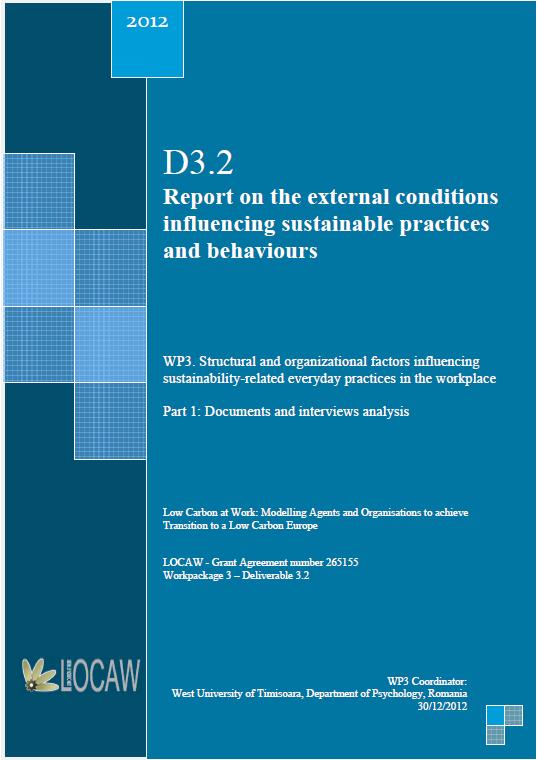
This work package aims to provide a comprehensive analysis of the macro‐factors influencing everyday practices and behaviors in the workplace, in four different organizations. Organizations are nested within a political, economic and social context which creates either barriers or drivers for implementing sustainable working practices. The external context acts as sets of boundary conditions on the organizations, generating specific opportunities and obstacles for change. A comprehensive analysis of these macro‐factors in four case studies will provide relevant information on how to promote policies that enhance opportunities and minimize the influence of obstacles in transitioning to a sustainable low carbon Europe.
On the one hand, these macro‐factors will be analyzed as reflected in organizational documents, and on the other, we will look at how people understand and perceive the influence of these macro factors on their everyday behaviors at work. The data obtained in this work package will be complemented with the data obtained in WP5, on management and trade unions influence on organizational sustainability practices, thus reaching a comprehensive analysis of structural and organizational conditions influencing sustainable practices at work. Furthermore, in WP 5, data on the structural conditions of the two remaining case studies (heavy industries – United Kingdom and Sweden) will also be collected. The results of these two work packages, combined with results in WP2 and WP4 will be integrated in WP6, thus permitting a final synthesis, cross‐country comparisons and policy solutions for reaching a low carbon Europe.
WP3 includes:
a) An analysis of EU, national and regional sustainability regulations relevant for each organization;
b) An analysis of political, economic and social conditions (market characteristics, political environment, social aspects pertinent to the organization’s profile) in which the organization operates and of demands and pressures of relevant stakeholder groups;
c) An analysis of the ways in which the regulations and conditions described under a) and b) are understood and implemented in the organization (in the mission, strategic plans and everyday operations of the organization);
d) An analysis of existing organizational norms and their potential to act as barriers or drivers to the implementation and success of policies designed to reduce greenhouse gas emissions.
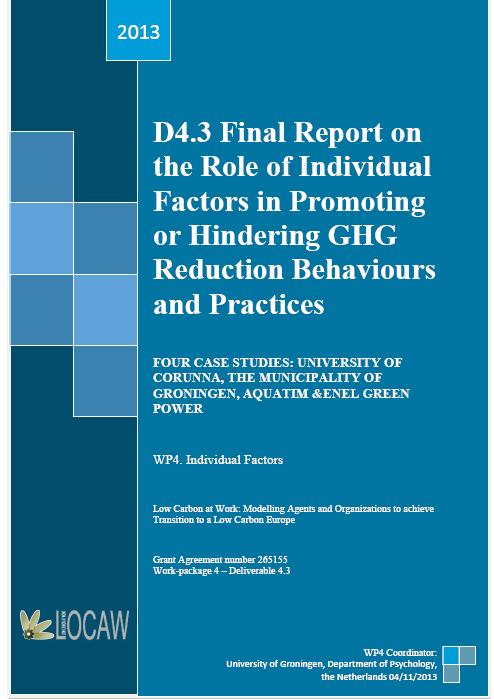
WP4 aims to provide an assessment of the barriers and drivers of everyday pro-environmental behaviours at work at a micro level, that is, the individual level.
In Deliverable 4.3 we aim to address the following main questions:
1. Which factors affect pro-environmental behaviour at work?
2. Is there a spillover effect from pro-environmental behaviour at work to pro-environmental behaviour at home?
This report consists of two parts. In the first part we discuss findings from a questionnaire study on which individual factors promote or hinder pro-environmental behaviour at work, and spillover from pro-environmental behaviour at work to pro-environmental behaviour at home. We present the results from a large-scale quantitative study (a questionnaire) among employees at different levels in the organizations in the four case study areas. The second part of the report presents results from a qualitative follow-up study. In this part we will discuss results of semi-structured interviews in which we investigate the main findings of the quantitative study in more depth.
In both parts of the report, we will discuss the results from studies in four case study areas: Enel Green Power (Italy), Aquatim (Romania), the University of Corunna (Spain) and the municipality of Groningen (the Netherlands).
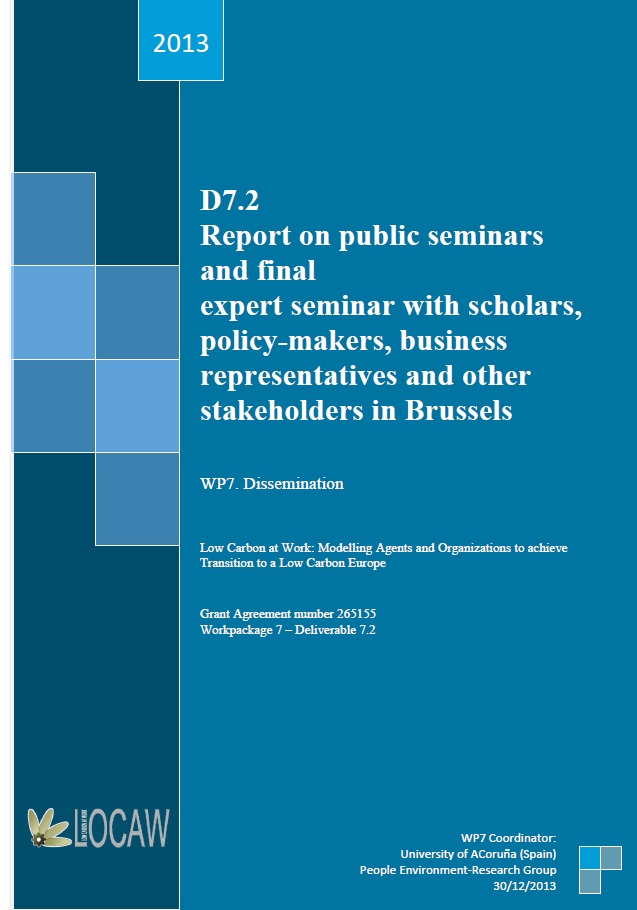
PUBLIC AND FINAL EXPERT SEMINARS
LOCAW designed and implemented a dissemination strategy that included a number of public seminars with relevant stakeholder in order to obtain feedback during all the stages of the project and use it to refine research design and also to disseminate the project and its results to a wide range of potentially interested stakeholder groups.
In order to achieve effective participation, LOCAW followed a series of principles and guidelines derived from the scientific literature on participation with diverse groups of stakeholders. These principles are presented in the first part of this report. The main focus of each seminar is then described together with the main points of discussion. Each seminar focused on certain stakeholder groups, depending on the case study site where it was held and on the stage of the project. Each seminar contributed to LOCAW ideas and design in significant ways
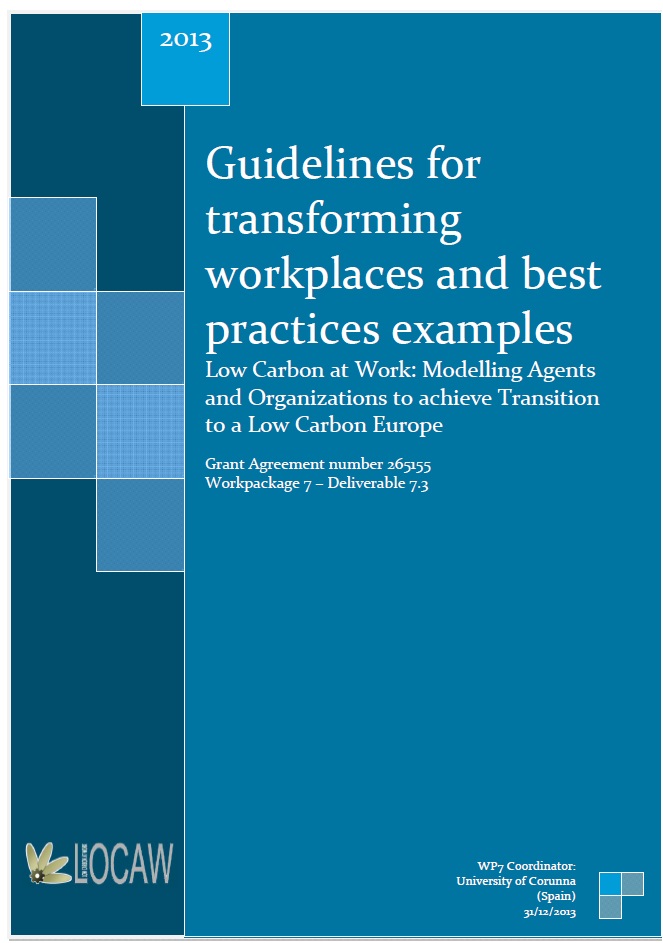 GUIDELINES FOR TRANSFORMING WORKPLACES AND BEST PRACTICES EXAMPLES GUIDELINES FOR TRANSFORMING WORKPLACES AND BEST PRACTICES EXAMPLES
Many of the barriers and drivers for implementing sustainable practices in the workplace were found to be related to the vertical and horizontal structures within the organisation, and associated communication patterns within and between different groups of workers within organisations.
Looking beyond the immediate boundaries of the organisation, this project has also advanced our understanding of the complex set of relationships between work, home and what might be termed ‘third spaces’ (spaces that have properties of either home or work but which are located out of the place usually associated with that activity). As we undertook in the proposal, by expanding the conceptual and theoretical ideas of work‐home relationships beyond simplistic notions of behavioural ‘spill‐over’, to include greater considerations of the complex nature of ‘border‐crossing’, the project has found that workers are less likely to take sustainable practices from home into the workplace than vice versa. There are some interesting examples of flow and border crossing in the opposite direction, but only under certain conditions.
|